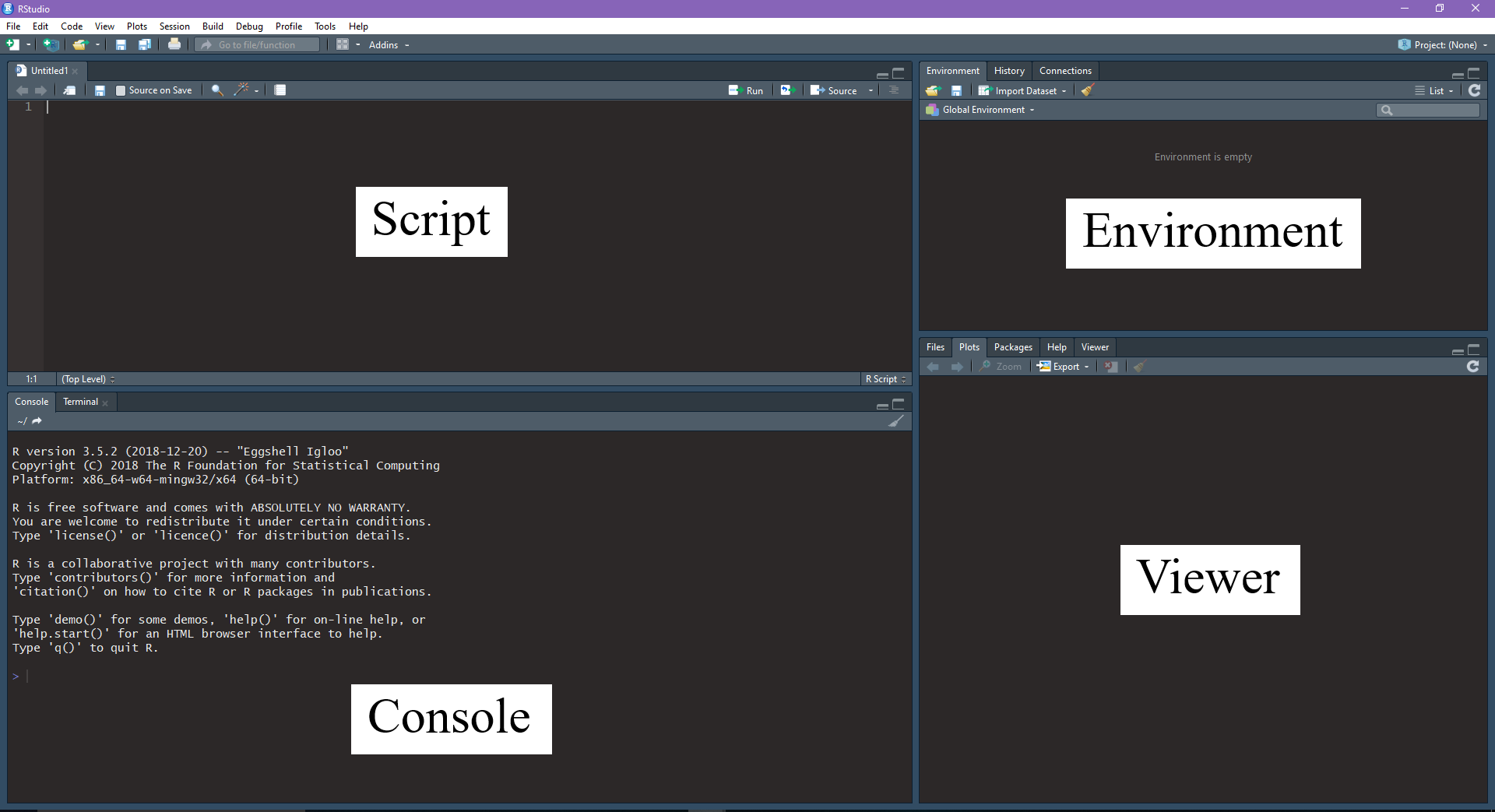I am running OSX 10.10, R-Studio Version 0.99.484, and R version 3.2.2. I just made a fresh install of R and R-Studio using the installers from their respective websites. I use install.packages to install 'mosaic' and then I try loading it using library, but it gives me the following error. A quick way to install XQuartz is with homebrew via homebrew cask.The advantage of homebrew is that it's a full-on package manager, so it not only makes it easy to install things all in one place, but also makes it easy to keep them updated. Click on Download R for (Mac) OS X. Click on Download R-3.5.1.pkg (or a newer version) or you use the following direct link: R-3.5.1.pkg. Download RStudio Desktop for mac from the RStudio. This download contains the installer for the current release of Microsoft R Open for 64-bit Windows (MRO-3.2.2-for-RRE-8.0.1). When you install Microsoft R Open, you can easily build R packages using your own custom code, or use additional packages that you download from CRAN. Configure your R IDE. After you download and install Microsoft R Open or open R, the next step is to get an integrated development environment, or IDE, for R. One such R IDE is R Tools for Visual Studio and another is RStudio. Your R IDE is where you'll write your code.
Using Bioconductor
The current release of Bioconductor is version3.12; it works with R version4.0.3. Users of older R andBioconductor must update their installation to take advantageof new features and to access packages that have been added toBioconductor since the last release.
The development version of Bioconductor is version3.13; it works with R version4.1.0. More recent ‘devel’versions of R (if available) will be supported during the nextBioconductor release cycle.
Install the latest release of R, then get the latest version ofBioconductor by starting R and entering the commands
It may be possible to change the Bioconductor version of an existinginstallation; see the ‘Changing version’ section of the BiocManagervignette.
Details, including instructions toinstall additional packages and toupdate,find, andtroubleshoot are providedbelow. A devel version ofBioconductor is available. There are goodreasons for using BiocManager::install() formanaging Bioconductor resources.
Install R
- Download the most recent version of R. The R FAQs and the RInstallation and Administration Manual contain detailed instructionsfor installing R on various platforms (Linux, OS X, and Windows beingthe main ones).
Start the R program; on Windows and OS X, this will usually meandouble-clicking on the R application, on UNIX-like systems, type“R” at a shell prompt.
As a first step with R, start the R help browser by typing
help.start()in the R command window. For help on anyfunction, e.g. the “mean” function, type? mean.
[ Back to top ]
Install Bioconductor Packages
To install core packages, type the following in an R command window:
Install specific packages, e.g., “GenomicFeatures” and “AnnotationDbi”, with
The install() function (in the BiocManager package) has arguments that changeits default behavior; type ?install for further help.
For a more detailed explanation on using BiocManager and its advanced usage,such as version switching, please refer to theBiocManager vignette.
[ Back to top ]
Find Bioconductor Packages
Visit the software package listto discover available packages.
To search through available packages programmatically, use the following:
For example, using a “^org” search pattern will show all of the availableorganism annotation packages.
[ Back to top ]
Update Installed Bioconductor Packages
Bioconductor packages, especially those in the development branch, areupdated fairly regularly. To identify packages requiring update withinyour version of Bioconductor, start a new session of R and enter
Use the argument ask=FALSE to update old packages without beingprompted. Read the help page for ?install for additional details.
Upgrading installed Bioconductor packages
Some versions of R support more than one version of Bioconductor. Touse the latest version of Bioconductor for your version of R, enter
Remember that more recent versions of Bioconductor may be available if yourversion of R is out-of-date.
For more details on Bioconductor approaches to versioning, seethe advanced sectionin the vignette and version numbering in the developer reference section.
Recompiling installed Bioconductor packages
Rarely, underlying changes in the operating system require ALLinstalled packages to be recompiled for source (C or Fortran)compatibility. One way to address this might be to start a new Rsession and enter
As this will reinstall all currently installed packages, it likelyinvolves a significant amount of network bandwidth and compilationtime. All packages are implicitly updated, and the cumulative effectmight introduce wrinkles that disrupt your work flow. It also requiresthat you have the necessary compilers installed.
[ Back to top ]
Troubleshoot Package Installations
Use the commands
to flag packages that are either out-of-date or too new for yourversion of Bioconductor. The output suggests ways to solve identifiedproblems, and the help page ?valid lists arguments influencingthe behavior of the function.
Troubleshoot BiocManager
One likely reason for BiocManager not working on your system couldbe that your version of R is too old for BiocManager. In orderavoid this issue, please ensure that you have the latest version of Rinstalled in your system. BiocManager supports R versions from 3.5.0and above.
[ Back to top ]
Why use BiocManager::install()?
BiocManager::install() is the recommended way to install Bioconductorpackages. There are several reasons for preferring this to the‘standard’ way in which R pacakges are installed viainstall.packages().
Bioconductor has a repository and release schedule that differs from R(Bioconductor has a ‘devel’ branch to which new packages and updatesare introduced, and a stable ‘release’ branch emitted once every 6months to which bug fixes but not new features are introduced).
A consequence of the mismatch between R and Bioconductor releaseschedules is that the Bioconductor version identified byinstall.packages() is sometimes not the most recent ‘release’available. For instance, an R minor version may be introduced somemonths before the next Bioc release. After the Bioc release the usersof the R minor version will be pointed to an out-of-date version ofBioconductor.
A consequence of the distinct ‘devel’ branch is thatinstall.packages() sometimes points only to the ‘release’repository, whereas Bioconductor developers and users wantingleading-edge features wish to access the Bioconductor ‘devel’repository. For instance, the Bioconductor 3.0 release is availablefor R.3.1.x, so Bioconductor developers and leading-edge users need tobe able to install the devel version of Bioconductor packages into thesame version (though perhaps different instance or at least librarylocation) of R that supports version 2.14 of Bioconductor.
An indirect consequence of Bioconductor’s structured release is thatpackages generally have more extensive dependencies with one another,both explicitly via the usual package mechanisms and implicitlybecause the repository, release structure, and Bioconductor communityinteractions favor re-use of data representations and analysisconcepts across packages. There is thus a higher premium on knowingthat packages are from the same release, and that all packages arecurrent within the release.
The BiocManager package serves as the primary way to ensure thatthe appropriate Bioconductor installation is used with respectto the version of R in use regardless of the R and Bioconductorrelease cycles.

The install() function is provided by BiocManager. This is awrapper around install.packages, but with the repository chosenaccording to the version of Bioconductor in use, rather than to theversion relevant at the time of the release of R.
install() also nudges users to remain current within a release, bydefault checking for out-of-date packages and asking if the user wouldlike to update
The BiocManager package provides facilities for switching to the‘devel’ version of Bioconductor
(at some points in the R / Bioconductor release cycle use of ‘devel’requires use of a different version of R itself, in which case theattempt to install devel fails with an appropriate message).
The BiocManager package also provides valid() to test that theinstalled packages are not a hodgepodge from different Bioconductorreleases (the ‘too new’ packages have been installed from sourcerather than a repository; regular users would seldom have these).
For users who spend a lot of time in Bioconductor, the featuresoutlined above become increasingly important and install() is muchpreferred to install.packages().
[ Back to top ]
Pre-configured Bioconductor
Bioconductor is also available as a set ofAmazon Machine Images (AMIs) andDocker images.
Legacy and Older R Versions
It is always recommended to update to the most current version of R andBioconductor. If this is not possible and R < 3.5.0 , please use the followingfor installing Bioconductor packages
To install core packages, type the following in an R command window:
Install specific packages, e.g., “GenomicFeatures” and “AnnotationDbi”, with
R-studio Download For Mac
[ Back to top ]
When was the last time you update your R and RStudio?
I installed RStudio and R a year ago, and never update it since then. Today I just noticed I cannot install new R packages because of my old R version. So I explore some ways to update R and would like to share with someone who is also looking to update R on RStudio.
The problem
RStudio and R cannot update on their own because some packages may not work after switching to the new version (You can still downgrade R version in RStudio if something went wrong though). After you install the new version, the previously installed packages will not go to next version. So it is required extra procedures to move the packages.
Here are 3 ways you can update R version in RStudio. Note that we need to move the install R packages, which I will show how at the end.
3 Solutions to update R on RStudio
R Studio 3.2.2 Download Mac Version
Solution 1) Manually install (Recommended if you don't care about the old packages)
The first method is to download a new version of R from R website > CRAN. Then restart your RStudio. The new R version will be loaded automatically.
The new R version appear right after I install R and restart RStudio
Update 29/05/2019: For Mac users, solution 3 is too painful and not working well for me. This method is fast and working well. I would recommend to save your time from headache and use this method. Take note of your previous packages so you can install them again as needed.
Solution 2) Windows only – use installr
installr is the R package which helps install and update software.
The R code you will need for updating R is: (credit goes to Cara Wogsland for the code)
install.packages('installr')
library(installr)
updateR()
You can find the tutorial on how to use installr to update RStudio on R-Statistics website.
Solution 3) Mac only – use updateR
Similar to installr, updateR is the package to help updating R on Mac OS.
The R code you will need is these 5 lines: (credit goes to jroberayalas for the code)
install.packages('devtools') #assuming it is not already installed
library(devtools)
install_github('andreacirilloac/updateR')
library(updateR)
updateR(admin_password = 'Admin user password')
You can find in-depth tutorial on how to use updateR package on this blog.
How to move the previously installed R packages
This is the instructions for Mac OS user (who used solution 1 or 3 above). For Windows user, installr package will do this for you
(credit goes to RyanStochastic and micstr):
1. Move all folders from your old R version to new R version.

/Library/Frameworks/R.framework/Versions/x.xx/Resources/library
Replace x.xx with the old and new R version at a time.
Note that you have to move only the packages that are not currently in the destination folder (because those are the base packages, and you don’t want to ruin them). But if you already did replaced everything, the next step will solve this for you.
If you cannot find the proper path, you can run this command to check: installed.packages()
2. Update the moved packages
Run the following command in R. Type ‘y’ for every question that popped up.
update.packages(checkBuilt=TRUE)
3. Type the following command in R to check if everything went well
version
packageStatus()
That’s it! Hope you guys success in updating R. If not, please check in the reference link below.
References: https://stackoverflow.com/questions/13656699/update-r-using-rstudio

